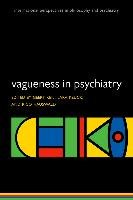In psychiatry there is no sharp boundary between the normal and the pathological. Although clear cases abound, it is often indeterminate whether a particular condition does or does not qualify as a mental disorder. For example, definitions of subthreshold disorders and of the prodromal stages of diseases are notoriously contentious. Philosophers and linguists call concepts that lack sharp boundaries, and thus admit of borderline cases, vague. Although blurred boundaries between the normal and the pathological are a recurrent theme in many publications concerned with the classification of mental disorders, systematic approaches that take into account philosophical reflections on vagueness are rare. This book provides interdisciplinary discussions about vagueness in psychiatry by bringing together scholars from psychiatry, psychology, philosophy, history, and law. It draws together various lines of inquiry into the nature of gradations between mental health and disease and discusses the individual and societal consequences of dealing with blurred boundaries in medical practice, forensic psychiatry, and beyond. Part I starts with an overview chapter that helps readers to navigate through the philosophy of vagueness and through the various debates surrounding demarcation problems in the classification and diagnosis of mental illness. Part II encompasses historical and recent philosophical positions on gradualist approaches to health and disease. Part III approaches the vagueness of present psychiatric classification systems and the debates concerning their revision by scrutinizing controversial categories such as post-traumatic stress disorder and by looking into the difficulties of day-to-day diagnostic and therapeutic practice. Part IV finally focuses on social, moral, and legal implications that arise when being mentally ill is a matter of degree.

